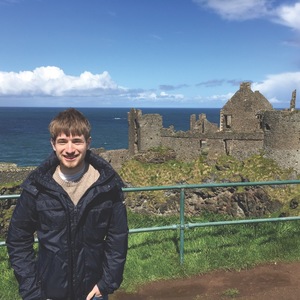

Keegan Luckey-Smith stands near Dunluce Castle in Northern Ireland.
East Tennessee State University students have the opportunity to participate in travel to Scotland and Ireland, where they study at universities and engage in cultural events and field experiences. Through the study abroad experience, students gain a deeper knowledge and understanding of those two cultures.
In turn, they gain new perspectives on their own culture and nation and develop an awareness of their own cultural values and biases.
The course helps students develop the ability and self-confidence to communicate and function within a new environment. Course content relates directly to participants' studies at ETSU, widening perspectives, analytical skills and tolerance for disparate viewpoints. The study abroad course motivates students to pursue further research and contributes to their worldview.
"The study abroad course has inspired further study in Scotland for two of our participants," Jane MacMorran, program director, says. "Jacob May, of Elizabethton, Tennessee, recently completed his Ph.D. in Forensic Anthropology at the University of Edinburgh. Lu Livingston went on to complete a masters degree at Orkney College in Literature of the Highlands and Islands."
The Appalachian, Scottish and Irish Studies Program offers study abroad opportunities at these four locations.
The University of Ulster (Magee Campus in Derry)
The university offers a varied program of cultural studies with daily morning lectures and afternoon fieldtrips. Derry is an important center for the study of emigration and settlement. A visit to the Ulster Scots Heritage and Education Center connects the settlement of the Southern Appalachian region to Northern Ireland. This study of emigration and settlement widens the perspectives students have of our region and its relationship to the wider world.
"A study of the music, folklore and literature of Northern Ireland provides additional links in the "carrying stream' that connects our cultures," MacMorran says. Fieldtrips have included Bogside Murals, Walled City, Ulster American Folk Park, Monreagh Ulster Scots Education Centre, Pat Finucane Center for Human Rights and Social Change, Giant's Causeway, Transport Museum, Tower Museum, Free Derry Museum, and the Titanic Experience (Belfast).
Orkney College
Life in the Orkney Islands stands in bright contrast to the modern sights and sounds of Edinburgh. Orkney College, a member of the University of the Highlands and Islands system, offers a summer school program of study that is "unique and amazing," says MacMorran. Kirkwall, the primary location and largest city in the Orkney Islands, gives students the opportunity to visit archaeological sites such as Skara Brae and Maeshowe, which date back 5,000 years. Through morning lectures and afternoon field trips, students gain a new perspective on the heritage of Scotland and Ireland as they study Viking culture, language, music, dance and island life. Students have the opportunity to interact with community members and Orkney students in a musical setting, as well as test their Orcadian linguistic skills.
Lectures have included Viking culture, religion, mythology and ancient runes, Orkney through time, history of Scapa Flow and the Italian Chapel, Orkney's role in WWII, Orkney's dialect, music workshops with local musicians and open traditional music sessions.
Fieldtrips have included a literature tour of Kirkwall, archaeological sites of Skara Brae, Maeshowe, Broch of Gurness, St. Magnus Cathedral, Standing Stones of Stenness, Ring of Brodgar and Orkneyinga Saga Center. "Orkney College Summer School provides outstanding lectures and fieldtrips, and the Orkney experience provides a new lens for examining the culture of Scotland and our own nation," MacMorran says.
Glasgow: Royal Conservatoire of Scotland/Museums
In the heart of Glasgow's capital city, students visit and study the architecture of Charles Rennie Mackintosh. From the Willow Tea Room to the Mackintosh House, students have the opportunity to learn about Scotland's most famous architect. Students also visit the Hunterian and Kelvingrove museums that chronicle Scotland's past, present and future.
Participants tour the Conservatoire, where musicians have the opportunity to participate in a master class with fiddler Alistair McCulloch and lectures with folklorist Margaret Bennett. Lecture topics include the history of the Highland bagpipes; traditional Scottish fiddling; traditional music in the conservatoire; modern takes on old tunes and Scottish folklore, customs and beliefs.
University of Edinburgh
At the University of Edinburgh students learn about the importance of The School of Scottish Studies – its mission, founding and current research projects – and its role in preserving traditional culture.
Students visit and use the School of Scottish Studies Archives and learn how to access its resources from home. Lectures and discussions help students reflect on what they have seen and experienced. They discuss Scottish identity, nationalism and other modern-day issues. Dr. Gary West, chair of the Department of Celtic and Scottish Studies, facilitates a question and answer wrap-up session.
Other lecture topics include Scottish identity and nationalism, digitized archive of oral culture, the Scottish national party and the fiddle in Scottish culture.
Fieldtrips have included Scottish Parliament, bus tour of Edinburgh; tour of the University of Edinburgh; The Elephant House (Harry Potter and J.K. Rowling); National Portrait Gallery, Royal Botanic Garden, as well as free time for participants to pursue their own interests.
THERE'S MORE:
>> Mother & son lead Celtic music program